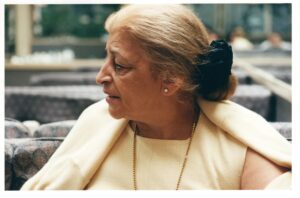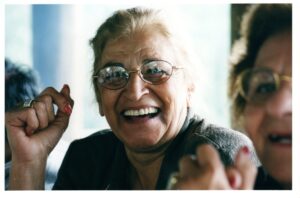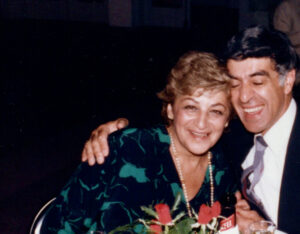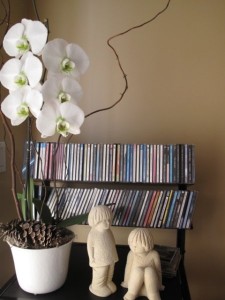Posts Tagged ‘music’
You Are My Sunshine: Remembering
We shared a birthday.
Auntie Laila and me.
And every year, when March 29th rolled around, I would call her, or she would call me.
This year marks the final such exchange.
Auntie Laila died yesterday.

Just as her personality was larger than life, the impact she had on me is much larger than the quantifiable amount of time that we spent in each other’s company.
We’re also part of an extended family in a culture where the furthest relation is as close as your brother or your sister, your mother or your father.
Auntie Laila was married to my Uncle Ed who is in fact my paternal grandfather’s first cousin.
That gives you a sense of how distant we are from one another on the family tree.
However, when it comes to human connection, closeness defies measurement. You cannot measure love in metres, centimetres, and kilometres or miles, inches, and yards.
When it comes to family, to those we love, distance is only every measured in heartbeats, thoughts, and dreams. If you think of a person, then they are with you. If you dream of a person, then they are with you. And when such a person dies, they never leave you.
The strength of the tie between Aunt Laila, her daughter Medina, my mother, and my sisters can be traced to a particular time and place.
We were living in Beirut in the early 1970s when Aunt Laila and Medina came to visit. In my memories, my father wasn’t there. He worked in Kuwait and was typically home for only one week every month or so.
This must have been one of the times he was away. The task of entertaining and touring fell to my Mom who at the time drove a red, four-door Peugeot. We crammed into the car, all six of us, for whichever excursion Mom and Auntie Laila had dreamt up. We would pass the time in conversation, laughter, and with music. In particular, a song.
“You are my sunshine, my only sunshine …”
Whether careening around the streets of Beirut or driving up to Karoun, the family village in the Bekaa Valley, we’d sing loudly and exuberantly with Auntie Laila leading the choir as the minutes ticked by on the clock and the kilometres of asphalt flowed under the tires.
“You make me happy when skies are gray …”
From that point on, Auntie Laila and my mother were sisters and whenever they were together they would gossip, they would giggle, they would laugh out loud. They supported one another, they travelled together, and they cooked for everyone.

When Mom died in 2015, Auntie Laila was unable to travel to Vancouver for the celebration of life, but she was in that room with us all.
She was there.
Knowing that Auntie Laila’s illness was advancing, and with the loss of another family matriarch that year, I was overwhelmed with the need to see her.
To hug her. To hear her say “Ya aini, ya habibti…”. My eyes, a profound endearment in Arabic, my dear one.
So, Luc and I did just that. We went to see Auntie Laila.
We embarked on a three-week road trip that took us from Vancouver to Kamloops, Jasper, Grande Prairie, Edmonton, Calgary, Lake Louise, Kelowna, and back home. At many stops along the way, we spent time with friends and family members. And in Grande Prairie, we caught up with Auntie Laila and the many relatives there.
It was magical.
“You’ll never know dear, how much I love you
Please don’t take my sunshine away …”
The last time I saw Auntie Laila in person was early December 2019.
I had suggested to my father that we visit Grande Prairie because the one truth that we continue to forget and have to relearn is that life — no matter how much we try to wrestle it to the ground — is random and change can come suddenly even when it seems like we will have forever. The toll of age and illness is never predictable. The time to go and see, to stop and call, to visit and reminisce is always now although it is not often feasible to follow through on such intentions and desires.
We were lucky enough to make plans and to act on them.
Dad and I travelled to Grande Prairie. As he challenged Uncle Ed to consecutive games of crib, I sat on the couch in the family room or in the living room and Auntie Laila sat in her chair. We would chat or not, we watched the Christmas movies playing on the television, or not. It didn’t really matter. What mattered is I could look up and see that she was there. I could smile at her, I could hug her, I could say, “I love you.”
The last time I saw Auntie Laila was just a few weeks ago on March 14th during a Zoom call that gathered households together from around the world to celebrate a number of family milestones.
Auntie Laila didn’t say anything, and she may not have quite understood what all the fuss was about, but just to see her made me tear up because while it felt as if she were in the room with me, she was so very far away.
“The other night dear, as I lay sleeping
I dreamt I held you in my arms …”
And now the connection has been disrupted.
There is comfort in the idea of Auntie Laila at peace, or more accurately — as my cousin Medina said to me on the phone today — she is somewhere cooking, shopping, laughing, gossiping, and partying up a storm with Alma, Haifa, Maza, and Yulanda among so many others.
It is, however, a cold comfort because the void she leaves behind is immense. It is now a distance that we will all only be able to traverse in our dreams, in our memories, and in our hearts.

In the stories we share with one another, over the years to come, of a woman who meant so very much to each and every one of us.
“But when I awoke, dear, I was mistaken
So I hung my head and I cried.”
A Song And Its Resonance
There is this song.
I have listened to it obsessively. Usually at night before I turn off the lights. As a remedy, as a tonic, as an anthem for the work I’m doing and the work I hope to do.
I’ve written about music and memory before (see here), but this is different. This is about now and the way this music spurs me on in the current social and political climate.
This song is a spark. A spark that is a component of the antidote we need in these dark times of hate, intolerance, and evil.
It’s from a movie I’ve never watched and perhaps there’s a risk in viewing only one four-minute segment from a feature-length film. This video is also now almost a year old. I only discovered it because of YouTube’s algorithmic operation. The same algorithms that have contributed to so much of the strife and misinformation that contaminate our news and information diets.
The song is from the movie The Greatest Showman. “This Is Me” is sung by Keala Settle who plays Lettie Lutz in the movie (Annie Jones in real life), the Bearded Lady and one of P. T. Barnum’s original nineteenth century cast members. Leaving aside the nature of Barnum’s commercial project and even the commercial project from which this song is drawn, absorb the lyrics as you watch the video.
As much as the words move me, there is magic in the choreography. It’s that magic that pulls me in — every time. That resonates in my heart. The earthiness of the stamping feet, the power of the arms punched into the air, the rhythmic staccato of the bodies swaying. It’s solid, it’s demanding, it’s asserting the right of these bodies to exist as they are in all spaces. In the light, not the dark, in amongst you and me. In amongst us all.
There’s that moment when the performers are suspended in air. They’ve transcended the chains of exclusion and the labels of derision to float above their cares and their worries, but the truth is in the thud of their landing. That landing on two feet. That is when they reclaim their place. The true power of their existence is in the human groundedness of their experience.
And as much as I appreciate the beauty of the production values in this video, the version of the song that I treasure is this one.
Here, Keala Settle is not singing the song from the character’s perspective. As authentically as she might inhabit the character in the film, she is not Lettie Lutz. That is the masquerade.
In the workshop version, Settle embodies the song. She embodies the essence of the words, the heart of the matter. Here, she is singing her life story. She is reliving every struggle, every hurt, every joy, every triumph, and every hope. It’s that uncloaked look into who she is, who she is without adornment or disguise, that opens up the whole performance, hers and that of every other person in the room. You can see it in the ecstatic communion of their spirits and voices.
And the universality in the message of this song, the truth of it, is that we are all different. Our differences do not make us less than any other. They only do so when others associate difference with inferiority, with lack, with less-than.
Unfortunately, it is also a truth that those with power and privilege have gained their rank through a long historical process of magnifying and demonizing difference. Manipulating fear to validate sacrificing others for profit and prestige. For control.
So, there’s a radical — if not revolutionary — message in this song despite the fact that it’s embedded in a cultural artefact that itself is a product of our systems and structures of consumerism and privilege.
And it is this.
I know that there’s a place for us
For we are glorious
Each and every one of us.
And don’t let them, those who benefit from the exploitation of difference, ever tell you differently.
If they do, fight back.
Do not give them a platform to amplify and broadcast hateful messages.
Vote them out.
Music Down Memory Lane
The current climate in BC’s public education sector is fraught with emotion, tension, and conflict. As I look around for some words of comfort, here’s what comes to mind:
“Don’t worry about a thing,
‘Cause every little thing gonna be all right.
Singin’: “Don’t worry about a thing,
‘Cause every little thing gonna be all right!”
Bob Marley, Three Little Birds
A song by Bob Marley who, in addition to sharing his music with the world, played an integral role in resolving the crisis in Jamaican politics many years ago. By thinking of song and music, I’m not trivializing the contentious issues we face. I’m recognizing the way in which music helps us.

Music is central to our lived experience, individually and collectively. It may have even been a precursor to spoken language. Our cave ancestors likely communicated with rhythm and percussion long before they could yell out, “Run for your lives! Saber-tooth on the loose!”
Like smell or taste, sound can carry us down memory lane. It’s as if we each have a soundtrack to our lives.
As a pre-teen living in Beirut, I idolized Fairuz. There are many songs I associate with her, but one that has lasted with me, even as I’ve lost my fluency in Arabic, is a childhood chant from a decades-old movie which I’ve never seen. Did my grandmother teach me the words to the chorus? I don’t remember, but listening to it now, http://www.youtube.com/watch?v=gLb-n6OUfyk takes me back to a time — which may sound cliché — of innocence. It was before the Lebanese civil war which started in 1974. It was also the year we moved to Vancouver and I had to leave my family, my friends, all I’d known for the past five years, behind.
Thinking back to my high school years in West Vancouver is … well, let’s just say I prefer not to. Although a fluent English speaker and a capable student, I struggled to establish friendships in a new and different cultural environment. While Grade 8 went smoothly enough, Grade 9 was one of social isolation and misery. I think of it as my year of tears. From then through to graduation I continued in my role as a nerdy misfit, but I did find a circle of friends in Grade 10 which helped me tremendously. I recall many songs from this era, but Meatloaf’s album Bat Out of Hell stands out. My friend, my guardian angel at the time and with whom I regret losing touch, had bought the record (yes, it was the days of vinyl!). We’d sit in her room listening to the songs and it likely won’t surprise you that Paradise by the Dashboard Light occasioned much giggling — we were teenage girls! — and was played over and over and over again.
I’ve been thinking about music a lot lately as I watch my son discover the soundtrack to his life. I hadn’t expected his vibe to be so alternative and I believe that may be more a reflection of the paternal influence in his life! I may have introduced him to pop, musical theatre, and classical, but he’s introduced me to the charms of Laurie Anderson (which I have to admit elude me somewhat), Moby, Brian Eno, David Byrne, and Janelle Monaé amongst others. For our visit to Tofino during spring break, he was in charge of the playlists for our drive over and our evenings in.
And because I can’t stay away from education for too long, let me just say I don’t think there’s enough music in our schools although where there is music, fantastic work is being done by educators. I believe this is true of the arts in general: they are in danger of being underrepresented, on a general basis, in our curricula and the practice of day-to-day teaching and learning.
Why do I think this is an issue?
Because the arts, music and others, transport us beyond the limits of our humanity. They are universal, they are boundless, and they are the greatest expression of our potential to be creative, to create.
Music and art help us to defy gravity. http://www.youtube.com/watch?v=3g4ekwTd6Ig